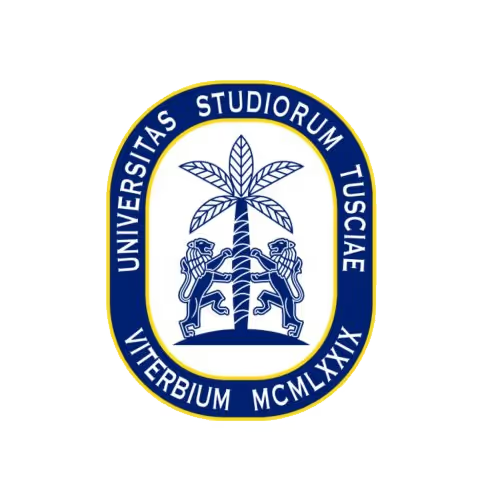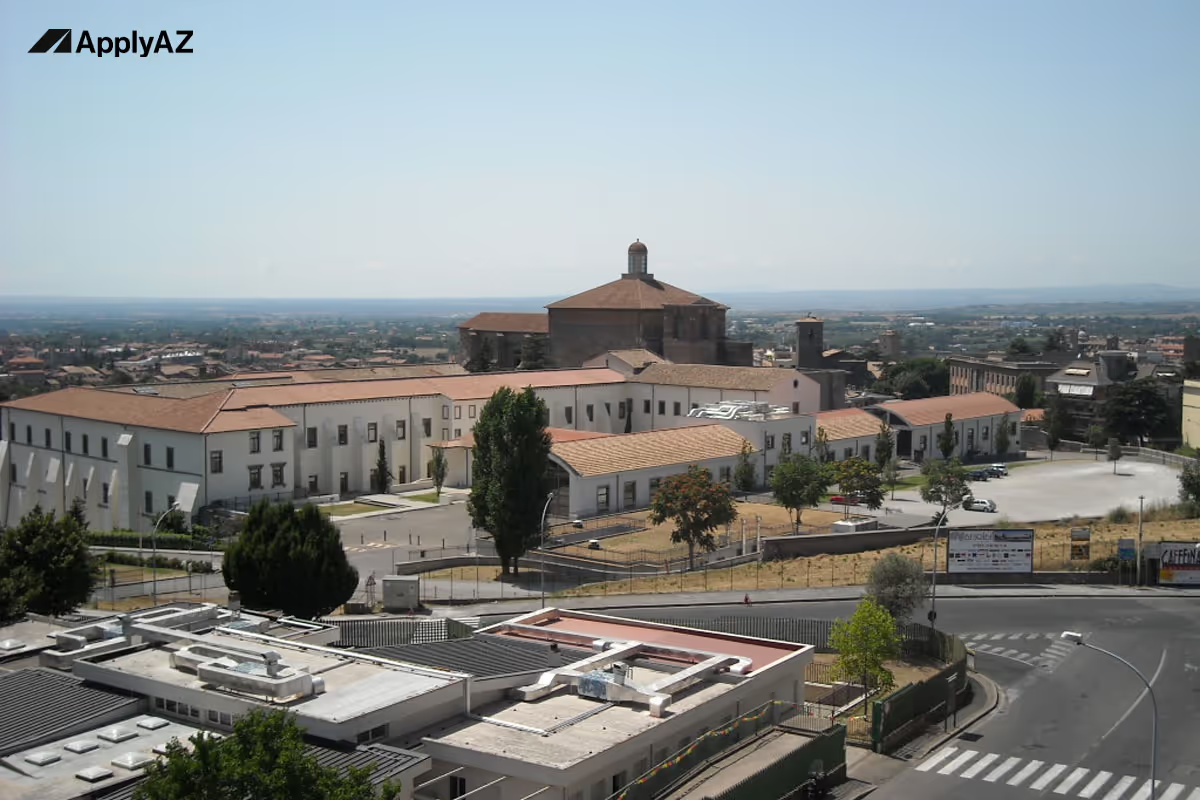Heading
Heading








University of Tuscia (Università degli Studi della Tuscia)
English-taught programs in Italy are booming, and the University of Tuscia (Università degli Studi della Tuscia) is part of that growth. Here you study in Italy in English, pay the low fees typical of tuition-free universities Italy, and enjoy the academic standards found across public Italian universities. Founded in 1979, Tuscia focuses on agri-food science, forestry, circular economy, and cultural heritage—fields that match the volcanic landscapes, Etruscan ruins, and bio-economy clusters of its home city, Viterbo.
A young public Italian university with deep local roots
Tuscia began as a network of small faculties housed in Renaissance cloisters. It now hosts six departments:
- Agriculture and Forestry Sciences
- Ecological and Biological Sciences
- Economics, Engineering, Society and Business
- Linguistics, Literature, History, Philosophy and Heritage
- Innovation in Biological, Agro-food and Forestry Systems
- Law and Social Sciences
The university ranks in the global top 400 for Agriculture and Forestry (QS 2025) and appears in the Times Higher Education Impact Rankings for Climate Action. Researchers advise FAO and UNESCO on food security and heritage conservation. With seminar groups rarely larger than 30 students, you work directly with professors on lab projects, field surveys, and peer-reviewed papers.
What you can study in Italy in English
Current English-taught degrees include:
- Circular Economy and Sustainable Tourism
- Forestry and Environmental Sciences
- Food Science and Technology
- Cultural Heritage – From Field to Digital
All follow the Bologna Process, so you can transfer credits or progress easily to European master’s programmes.
Viterbo: a medieval city that doubles as a living lab
Everyday life and affordability
Viterbo is a walled city of 65 000 residents, one hour north of Rome by train. Cobblestone lanes, natural hot-spring baths, and student cafés keep life relaxed and affordable.
- Housing: €260–350 per month for a single room in a shared flat.
- Meals: Mensa lunch costs €4.50 for pasta, salad, and fruit.
- Transport: A €20 monthly bus pass covers the city and nearby lakes.
- Climate: Winters hover around 6 °C; summers reach 30 °C but cool at night—perfect for outdoor study sessions.
Culture and leisure
- UNESCO-listed Macchina di Santa Rosa festival each September.
- Weekly farmers’ markets selling local hazelnuts and volcanic-soil vegetables.
- Romanesque churches, Etruscan tombs, and free museum nights.
Free Italian courses and tandem-language cafés help you integrate while keeping English as your study medium.
How the DSU grant helps
- Full fee waiver
- Free housing or rent allowance
- Two daily meals in canteens
- €1 700 yearly stipend for books and local travel
About 70 % of eligible applicants receive funding. ApplyAZ advisers guide you through translations, legalisations, and online forms.
Other options:
- Tuscia Merit Scholarship (€5 000) for top entrance-test scores
- Erasmus+ mobility grant (€400–500 per month)
- Ministry of Foreign Affairs scholarships for selected countries
Learning model: fieldwork, labs, and industry briefs
Hands-on classes
- Soil microbiology: collect samples in chestnut groves, analyse DNA in campus labs.
- Digital archaeology: 3-D scan Etruscan sites and build virtual tours.
- Circular-economy design: prototype bioplastic products in the FabLab.
Real-world projects
Professors embed consultancy tasks from local partners:
- Map drought risks for Acea (regional utility).
- Optimise hazelnut supply chains for Ferrero.
- Design visitor-flow dashboards for Lazio tourism board.
These projects add measurable impact to your CV.
Job and internship landscape
Key industries around Viterbo
- Agri-food and horticulture (hazelnuts, wine, olive oil)
- Forest management and biomass
- Cultural-heritage tourism and restoration
- Renewable energy (geothermal, solar)
Major employers
- ENEA Casaccia Research Centre (energy transition)
- Lazio Innova hub (agritech start-ups)
- Fiera di Roma (trade-fair organiser needing event analysts)
Non-EU students can work 20 hours weekly during term, full-time in breaks, easing living costs and building networks.
Graduate pathways
Tuscia alumni move on to:
- MSc in Plant Biotechnology at Wageningen University
- Erasmus Mundus master in Forestry Science (SUFONAMA)
- PhD in Cultural Heritage at the European University Institute
- Analyst roles at FAO headquarters in Rome
Employability stands at 88 % within one year (AlmaLaurea 2024), thanks to skills in field data, sustainability reporting, and digital heritage.
Why choose the University of Tuscia and Viterbo
- Quality teaching focused on green and heritage sectors.
- Affordable living in a historic yet student-friendly city.
- English-taught flexibility with free Italian support.
- Hands-on research that tackles climate, food security, and culture.
- Easy train link to Rome for internships and flights home.
Together they offer a balanced, inspiring, and budget-friendly route to a European degree.
In two minutes we’ll confirm whether you meet the basic entry rules for tuition-free, English-taught degrees in Italy. We’ll then quickly see if we still have space for you this month. If so, you’ll get a personalised offer. Accept it, and our experts hand-craft a shortlist of majors that fit your grades, goals, and career plans. Upload your documents once; we submit every university and scholarship application, line up multiple admission letters, and guide you through the visa process—backed by our admission-and-scholarship guarantee.
Food and Wine Technologies at University of Tuscia
Italy’s food culture needs no introduction, yet behind every perfect espresso and DOCG bottle lies science. The Food and Wine Technologies bachelor at the University of Tuscia lets you explore that science in English while paying the modest fees used by tuition-free universities Italy. You study in Italy in English, learn to control flavour, safety, and sustainability, and graduate from a respected public Italian university located in Viterbo, a medieval town one hour north of Rome.
Why this English-taught option stands out
Many English-taught programs in Italy focus on business or art; few dive deep into agriculture and oenology. Tuscia fills that gap. Founded in 1979, the university ranks in the global top 400 for Agriculture and Forestry. Professors advise EU bodies on food security and train start-ups in bio-based packaging. Small classes—often under thirty students—mean you discuss fermentation data with researchers who publish in Food Chemistry.
Project-based learning drives the curriculum. Recent cohorts developed gluten-free pasta from chestnut flour grown on volcanic soil and trialled blockchain tracking for extra-virgin olive oil. These projects answer real supply-chain problems and feed directly into local businesses, a key advantage over theory-heavy courses elsewhere.
Viterbo itself hosts hazelnut groves, organic wineries, and thermal-spring tourism. Living in the region gives you daily fieldwork, fresh ingredients, and cultural immersion without the crowds of larger cities. You taste terroir while you study it.
Study in Italy in English: course structure and learning journey
The Food and Wine Technologies degree awards 180 ECTS across three years. All core modules are delivered in English; Italian is optional for students who want deeper integration or part-time work.
Year one: foundations
- General chemistry and organic chemistry build your lab skill set.
- Basic microbiology shows how yeasts, moulds, and bacteria shape flavour.
- Mathematics for life sciences teaches statistics used in sensory panels.
- Introduction to food industry explores EU safety law and supply chains.
Field trips include a guided visit to a PDO pecorino cheese plant where you sample curds at different pH stages.
Year two: specialisation
- Food biochemistry explains enzymes, antioxidants, and Maillard browning.
- Viticulture and oenology cover grape physiology, vineyard management, and fermentation kinetics.
- Food engineering introduces heat-exchange, drying, and packaging machines.
- Quality control labs train you on gas chromatography and spectrophotometry.
You will design an experiment comparing steel and oak ageing for local merlot, then present sensory data to winery owners.
Year three: integration
- Sustainability and circular economy in agri-food evaluates waste-to-energy models.
- Marketing and export management equips you to pitch products abroad.
- Electives include craft-beer technology, functional foods, and HACCP auditing.
- A six-month internship counts for twelve credits and often becomes a job offer.
Your final thesis may analyse terroir effects using GIS or test eco-labels with consumer focus groups.
Continuous assessment keeps exam stress low. Reports, lab notebooks, and group presentations form half your marks. Professors give feedback within a week, so you adjust methods quickly.
Campus life and local flavour in Viterbo
Affordable living
Rents in Viterbo range from €260 to €350 for a room in a shared flat; university dorms cost similar and include utilities. A €20 monthly bus pass covers routes across the city and to nearby lakes. Mensa lunches of pasta, meat or veggie main, salad, and fruit cost €4.50.
Culture and climate
Medieval walls encircle cobbled lanes filled with cafés where an espresso costs €1.30. Hot-spring pools at Bagnaccio steam year-round, offering student discounts. Winters are mild (6–10 °C) and summers hit 30 °C but cool at night, perfect for tasting gelato under starlit arches.
Student support
Tuscia’s language centre offers free Italian courses. The sports office organises five-a-side football, rowing on Lake Bolsena, and vineyard trail runs. A counselling service helps with homesickness and exam anxiety. Study spaces include a 24-hour library in a former monastery, complete with Wi-Fi and espresso machines.
Tuition-free universities Italy: fees, the DSU grant, and extra aid
As a public Italian university, Tuscia links tuition to family income. Annual fees:
ISEE income (€/year)Tuition per year*Up to 13 000€013 001–30 000€300–80030 001–50 000€800–1 600Above 50 000€1 900 max
*Plus regional tax of about €140.
DSU grant essentials
The DSU grant can remove fees entirely, provide free housing or a rent stipend, cover two canteen meals daily, and add a €1 700 allowance for books and travel. Around seventy per cent of eligible applicants receive support.
Other opportunities include the Tuscia Merit Scholarship for top entrance-test scores, Erasmus+ mobility grants of €400–500 a month, and national scholarships for international students in Italy funded by the Ministry of Foreign Affairs.
Industry links and internship network
Local strengths
- Hazelnuts: Viterbo province supplies Ferrero, opening quality-control placements.
- Wine: DOCG appellations such as Est! Est!! Est!!! create roles in sensory analysis and export logistics.
- Olive oil: Mills need technicians to monitor pressing temperatures and phenolic levels.
- Dairy: Pecorino Romano consortia hire interns to test brining protocols and microflora.
Wider opportunities
Fast trains reach Rome in 80 minutes, giving access to UN FAO headquarters, biotech firms, and gourmet importers. Past students interned at Eataly’s product-development lab and at the European Food Safety Authority in Parma through Erasmus+ Traineeships.
Career outcomes
Ninety per cent of Tuscia food-science graduates find relevant work within a year. Typical positions:
- Process technologist in pasta factories
- Junior oenologist in Tuscan wineries
- Quality auditor for organic-certification bodies
- R&D associate in plant-based dairy start-ups
Starting salaries average €30 000 in Italy and €38 000 in northern Europe. Many alumni pursue master’s degrees in Food Innovation or Wine Marketing while employed part-time.
Five reasons to choose Food and Wine Technologies at the University of Tuscia
- Study cutting-edge agri-food science through an English-taught program in Italy.
- Live affordably in a medieval city with hot springs and vineyard hikes.
- Pay little or no tuition thanks to the DSU grant at a public Italian university.
- Gain hands-on skills in wineries, cheese plants, and sensory labs.
- Access ApplyAZ’s end-to-end guidance, from application to first job.
Ready for this programme?
If you qualify and we still have a spot this month, we’ll reserve your place with ApplyAZ. Our team will tailor a set of best-fit majors—including this course—and handle every form and deadline for you. One upload, many applications, guaranteed offers, DSU grant support, and visa coaching: that’s the ApplyAZ promise. Start now and secure your spot before this month’s intake fills up.

They Began right where you are










